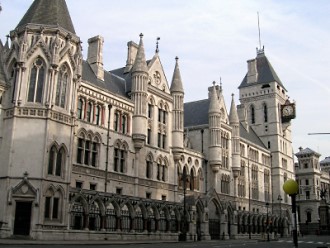Follow up to March 2022 judgment considers Secretary of State's conduct
Deighton Pierce Glynn (DPG) solicitors reported yesterday that the High Court ruled on Friday that a "failure of governance" had led to the unlawful 2020 policy and practice of seizing mobile phones from all migrants who entered the UK after crossing the Channel in small boats.
 Image credit: WikipediaIt follows the earlier March 2022 High Court judgment which found that the Home Office acted unlawfully and breached human rights and data protection laws by operating the policy of seizing, retaining and extracting data from the mobile phones of asylum seekers.
Image credit: WikipediaIt follows the earlier March 2022 High Court judgment which found that the Home Office acted unlawfully and breached human rights and data protection laws by operating the policy of seizing, retaining and extracting data from the mobile phones of asylum seekers.
Gold Jennings Solicitors noted yesterday: "[T]he High Court on Friday 14 October 2022 took the unusual further step of holding another hearing to consider the Defendant's conduct in the case. That followed the Defendant initially failing to disclose in pre-action correspondence and summary grounds of defence the policy that they later admitted was unlawful. The Defendant had admitted and apologised for breaching her duty of candour, but the High Court were sufficiently concerned that this further hearing was held to consider the issue."
The Guardian reported on Friday that Lord Justice Edis and Mr Justice Lane delivered a strongly-worded oral judgment, stating: "We are concerned with a failure of governance which allowed an unlawful policy to operate for an unknown period of time."
Speaking for the Government, Sir James Eadie told the Court: "The errors here were corporate errors. They were errors of the team, from counsel to government legal department to the Home Office. Everyone accepts that errors were made."
According to the Guardian, all migrants who had their phone seized after crossing the Channel between April and November 2020 may now be able to claim compensation. Around 2,000 phones are believed to have been seized in total while the policy was in operation.
The High Court ordered the Home Secretary to inform all those who were subjected to the policy that their rights had been breached, according to Gold Jennings Solicitors. The Guardian says that the Home Office has already written to over 1,300 people. Insufficient records mean, however, that over 400 phones cannot be traced to an owner.
Clare Jennings of Gold Jennings commented: "Potentially thousands of phones were seized from vulnerable migrants, many of whom never got their phones back, with significant numbers having had a huge quantity of private information downloaded from seized phones. It is important and right that all those affected by this unlawful policy are told that their rights were breached and the Court's ruling will help ensure that this happens".
DPG's Daniel Carey said: "All of this had real impacts on very vulnerable people, who lost touch with their families and couldn't get their asylum documentation, while the phones languished on a shelf for many months, hundreds of which now cannot be returned. The policy was punitive in effect and I am pleased that the victims have been fully vindicated. It is another example of how a hostile environment policy opens the door to the erosion of basic human dignity."
Meanwhile, the Scottish non-profit media cooperative The Ferret had an exclusive report last week on the Home Office's use of location data from an international student's mobile phone to detain him for allegedly breaking his visa conditions.
Privacy International's legal officer Lucie Audibert said the case appeared to be a breach of privacy laws.
According to The Ferret, the international student's phone was accessed by officers during an immigration raid. Location data from the phone was used to accuse him of working extra hours at a care home.
The Ferret reported: "He and his wife were sleeping in the bedroom of the shared house where they were living in Stoke-on-Trent when immigration officers – who were carrying out an enforcement raid – forced their way in at 6am. Though the couple were not suspected of having broken any immigration laws and their names were not those sought by enforcement officers, Bahan says they forced him to hand over his phone, passport and ID card. They demanded his passcode and work address. After accessing the geolocation – or GPS – function on his phone they claimed he had been at the care home where he worked for more than his visa permitted."
The couple were taken to a police station for 24 hours and then taken to Dungavel Immigration Removal Centre (IRC).
Solicitor Kyle Dalziel from Latta Law told The Ferret: "It is standard that we are passed immigration papers from Dungavel – we can find that people are in all sorts of situations. But when we saw that this information had been gathered using his geolocation the whole team was shocked. It appears to be that they have taken his phone without consent, and ordered him to provide his passcode without legal advice. There was no evidence presented that they had any suspicion on which to act."
Privacy International's Lucie Audibert said: "[This] is just one example of the Home Office granting itself excessive powers of immigration enforcement. … These invasive searches and seizures are symptomatic of fishing expeditions whereby immigration officers use their powers to perform immigration raids [then] search individuals who are not suspected of a criminal offence and to try and find any kind of incriminating evidence against them."
A Home Office spokesperson told The Ferret that it did not comment on individual cases, but they added that Immigration Enforcement officers are permitted to exercise their powers under Section 47 of the Immigration Act 2016 when they have reasonable grounds to suspect an offence has been committed.